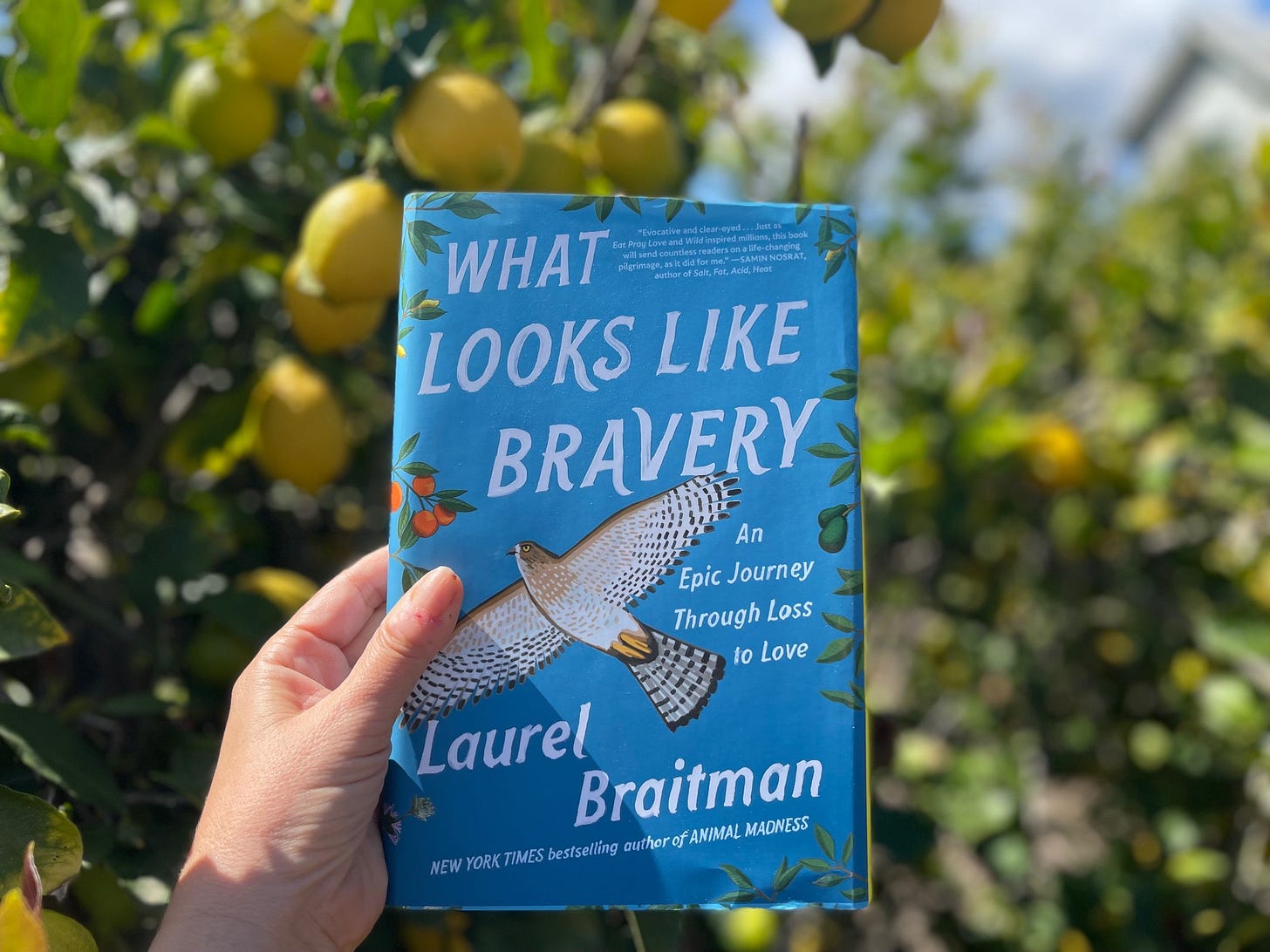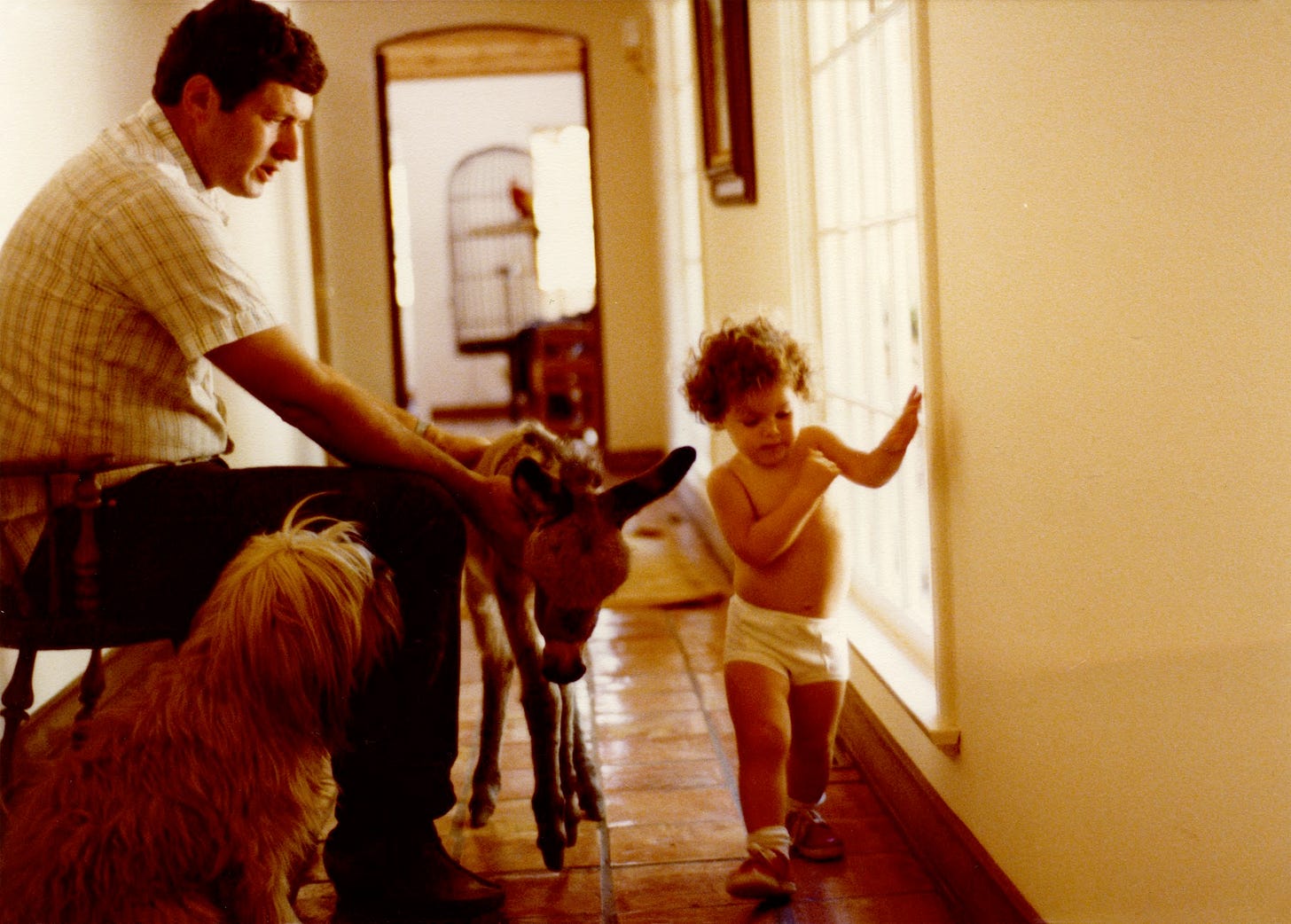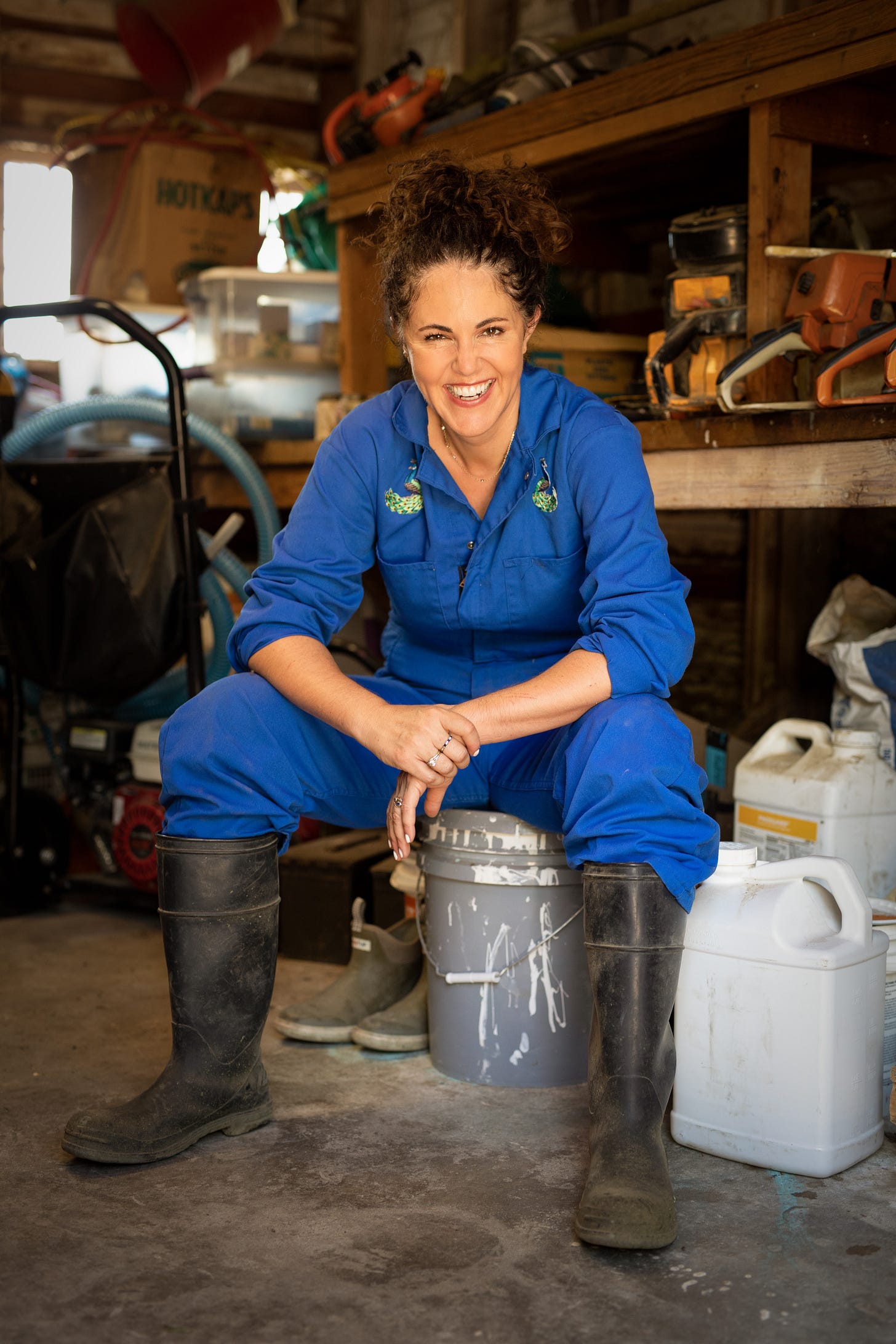"You can only write at the speed of your own self-awareness."
Laurel Braitman on writing loss & self
Hi, hello, welcome to the mid-week edition of Culture Study. One thing you learn by looking at analytics is that some of the people who open this newsletter without fail are also those who haven’t yet subscribed. And you know what: I get it. We all have so many things on our to-do lists, and subscribing to that newsletter you read every time it pops up in your inbox falls to the bottom.
But if you value the work that makes this happen twice a week, every week…that makes you think and introduces you to new thinkers and books and so much else….consider becoming a subscribing member. Your support makes this work just not possible, but sustainable.
I haven’t made many good friends since, oh, age 28. Some great text-group friends, some wonderful go-to-their-wedding friends, but very few “be super weird and utterly at home" with each other friends. Part of me thought that I had reached my quota, and shouldn’t ask or look for more. Then I met Laurel.
Laurel is unaccountable: I can’t quite explain just how great she is. If you’ve met her — if you, like me, like her actual best friend Samin Nosrat, can’t resist her — you get it. She is that wonderful thing we say about the best people: interesting and interested. She has a PhD in the history of science. She grew up on an avocado ranch filled with donkeys and peacocks (and avocados). She somehow looks good in one of those rancher hats?? WHO CAN DO THAT?!? She makes a mind-bending piña colada with a dark rum floater. She’s very skilled at sneaking into expensive hotel pools. She teaches writing to medical professionals at Stanford. And her new book is one of the most moving things I’ve read about loss and growing to understand the depths and misguidings of love.
Laurel’s father was diagnosed with terminal cancer when she was a young child; he then underwent extraordinary treatments in order to eke additional years and months and weeks with his family. His death was defining the way parental deaths are, but I don’t know that I’ve seen someone really work through how that sort of loss can both focus and distract you — how feeling it, and the echoing emptiness as it clangs around inside you, can lead you to recruit behaviors (even ostensibly “healthy” ones!) that allow you to feel something, anything, different.
You’ll get a sense of Laurel’s writing and general ethos in the questions below, but if you’re in the place to feel some feelings, I can’t recommend What Looks Like Bravery strongly enough — you can find it here. It’s everywhere on March 14th.
**Until March 15th, you can also get 20% off What Looks Like Bravery when you buy it at Bookshop and enter CULTURESTUDY in the promo box.**
You can follow Laurel on Instagram here and find her website (with links for her writing workshops with medical professionals) here.
Something I’ve been thinking about a lot is how people who don’t go to school to learn how to write — I’m talking, like, getting their MFAs — actually learn how to write. Some of my style was refined when I took a few creative writing classes in college, but I think I really, truthfully learned to write (and specifically: write about myself) when I started writing letters, to pretty much anyone and everyone, starting somewhere around 5th grade and lasting up until around 2004, when email and phones began to supplant them. How did you learn how to write, and how did you learn how to write about yourself?
I started writing when I was in first or second grade. Basically as soon as I could hold a pencil and knew how to string a sentence together. I wrote in a series of journals I kept more or less through high school. I also wrote little stories and homemade books and I told anyone who asked me, that I wanted to be a writer when I grew up. I have zero idea where this brazen conviction came from. I’d never met a writer. I just thought it sounded like a cool job you could do and also I’d get to read a lot of books. And then like you, once email and cell phones came around, I stopped and haven’t really kept a journal since. Photos and emails don’t have the same transporting quality handwriting on a page does for me.
Your question about “how I learned to write” makes me laugh. I immediately asked myself “I know how to write?” You’d think writing two books and teaching writing would make me think it’s something I know how to do. But the answer is that I feel, in my deepest core, that I don’t know what I’m doing and it’s mostly guesswork. Maybe this is something to talk to my therapist about lol. But I actually think it’s the feeling of the creative process itself. The “how-am-i-going-to-do-this” feeling is actually the feeling of doing it.
One of the overarching themes of Looks Like Bravery is what looks like high-achieving, have-it-all-do-it-all-ism is often a grief or trauma response. Can you talk a bit more for readers who haven’t read the book about how you used to understand your own standards for high achievement, and how that changed?
A number of years ago now, I trained to be a facilitator for kids who were grieving the loss of someone close to them (via a wonderful organization called Josie’s Place. I was also lucky to spend some time at the mothership of kid grief support, the Dougy Center in Portland, Oregon.
One thing I learned from the kids at these places — but also the administrators, therapists, volunteers and others — was that achieving, or overachieving, can be a way of acting out after a loss. Doggedly pursuing success can be a means of exerting control over an environment that feels uncontrollable. It’s also a coping mechanism you get rewarded for. The more you do it, the more adults around you say “Oh look at Laurel, she’s obviously just fine, she’s thriving” and they will focus more energy on a child who is perhaps better able to express their pain or sadness.
For decades, this was the coping mechanism I chose, and the better I did at school, at sports, and then in my career, the more the world seemed to respond positively. Popular culture is full of tales of kids with dead parents going on to achieve spectacular things. Have you ever noticed how many superheroes are orphans? I did, and I ate it up.
Excellence, I believed, would insulate me from pain and further loss. Even though in my heart of hearts, I knew better. I couldn’t admit it. So I doubled down on my strategy to outwork my sadness. And I was able to for a while — or, rather, I was able to because I was often too tired to entertain my own negative feelings and there were regular enough successes that I could mainline the drug of adult (and eventually, peer) approval on the feelings I couldn’t admit were there (shame, guilt, sadness, self-doubt).
I think I probably could have kept going on like this if I’d been lucky enough to avoid further losses. But I wasn’t. And when you’re doing all the things the orphans in the comics do but bad stuff keeps happening to people you care about, you’re kind of forced to re-evaluate. I needed a new strategy. I was exhausted from running so hard. What’s funny is that I’m not sure how much I’ve changed. I still work all the time. But I like my work and it feeds my spirit and I enjoy doing it. I think the biggest difference is that I do my work now not to numb myself but to FEEL.
My fuel isn’t the desire for perfection anymore, it’s meaning. And I know that it won’t protect me from a damn thing, nothing will. My only purpose is to enjoy the time I have.
You talk about it pretty briefly in the book, but getting medical professionals to write about their own experiences has become one of the cores of your work — both at Stanford and through your own workshops. I want to know how you started doing this work, and why it feels essential today…because you could also see your book as a way of convincing yourself to process the shit and joy of daily life in writing form. Like, did you realize that you were also teaching yourself as you were teaching others?
I feel like the biggest fraud teaching writing, you have no idea. I did not study writing and I have taken probably a handful of writing classes myself. My only qualification is the fact that I’ve spent the last 15 years doing it, to varying degrees of success. It turns out, this can make you a teacher!
The other thing I feel very fraudulent about is being a memoir writer. No one gives you permission to write about my own life and I can be a goody-two shoes who thrives on permission. Honestly, at first, I didn’t even want to write this book. I wanted to write a true crime novel featuring a wolf. A kind of In Cold Blood but make it animals. You can imagine what my agent said to this (though I do still want to write that book!).
Meanwhile, I’d written a little essay about my parents’ love language, which was grouchy pets. Everyone I talked to about it said ‘Write THAT.’ So here we are. I mean, the book is now about SO much more than my parents relationship and our surly animals…but it did start with the love language idea. And writing it, I learned how to write about my own life.
I tell this to my students now: you can only write at the speed of your own self-awareness. You do not want the reader to have a realization or insight about your life that you haven’t had already or they will lose respect for you. So it’s slow going. You process by doing. And it helps to be in therapy too. Now, teaching the medical students and physicians and nurses and other good folks in healthcare, I feel like I can be a bit more helpful to them. I don’t have answers, but I can keep them company as they look into the dusty boxes or locked cabinets of their own hearts to dig out the lessons. It’s where so much of the best stuff is, and I think it’s much easier if you’re not sorting through all that alone.
I really appreciated your representation of your decision to get an abortion: you came to understand that the ambivalence when you discovered you were pregnant, was, for you, a real sign of no, I do not want to be a parent. How did you think about writing that series of scenes, and how did it change (or not change) with time?
I’m so glad you asked me about this. I wrote this well before Roe was overturned and including it in the book has only felt more necessary as time goes on. I did worry that I was limiting the audience of the book if I included the abortion, turning off potential readers with whom the story might otherwise resonate. But in the end, I didn’t want to give a procedure that kind of power. I want to live in a world in which people read stories about other people who make different choices that are not written as moral lessons but rather as accountings of a life lived.
We should not have a border running through the middle of a bookstore! We read books about people that use owls instead of email, or are able to time travel, or who commit serial murders. Books are the very things that should allow us to safely, and in the comfort of our own homes, explore others’ perspectives that might differ from ours. I hope people who are anti-choice read this book and maybe they will disapprove of my choices, but I also hope they see my humanity. And for any readers who find themselves pregnant and unsure of what to do, perhaps seeing me make sense of my own decision will help them make sense of theirs, whatever they turn out to be.
We met because I know your husband, someone who features prominently in the book, and someone, as we’ve talked about, who’s changed a lot, like a lot, since I met him. Meeting you allowed me to see him through your eyes (and, in the book, your words) which has been a real and precious gift. When you wrote and edited the book, did you feel like you’re able to see yourself through different eyes? More gracious, more sympathetic, more understanding? Or were you harsher on yourself in earlier drafts — and others allowed you to see yourself more clearly? How, in other words, did you come to the portrait of yourself that now vibrates off the page?
I have always had a solid understanding of who I was, but that’s very different then figuring out how on earth to sound like yourself on the page. For me, the distance between my thoughts and my fingertips can feel like a million miles. For the first few drafts, what I was writing didn’t sound like the voice inside my head at all. And it took a few years to make them sound more similar and for me to learn that the voice inside my own head wasn’t an embarrassing narrator.
I feel like it should be the simplest thing to write like you speak or think. But oh my goodness it isn’t. Especially for those of us who’ve been in school for a while. We often learn, way too early, that our written voice should be self-serious, more formal, officious. And that’s fine if you’re writing rental applications or a resume, but if you want to write to make other people feel feelings (which is I think the main objective of writing — helping people feel rage, empathy, release, the contentment that comes with understanding something that was previously too-complex, joy, recognition, etc) then you must allow yourself yourself a much wider lane than just “sounding smart.” You must learn to sound like yourself. Interestingly enough, this process paralleled me gaining the confidence in myself, and what I’ve learned thus far in life to believe that it was worth sharing with other people.
Thank you for saying I vibrate. That is just the best compliment. You do too.
You can buy What Looks Like Bravery here. (Get 20% off this week with the code CULTURESTUDY at checkout!)
Subscribing is how you’ll access the heart of Culture Study in the form of the weirdly fun/interesting/generative weekly discussion threads. It’s also how you’ll get the Weekly Subscriber-Only Links Round-Up, including the Just Trust Me.
As always, if you are a contingent worker or un- or under-employed, just email and I’ll give you a free subscription, no questions asked. If you’d like to underwrite one of those subscriptions, you can donate one here.
On this week’s WORK APPROPRIATE, we’re talking about awkward salary conversations, how to push for that raise, and how to email white guys in your industry to ask them how much they make. Click the magic link to listen on your app of choice.
If you’re reading this in your inbox, you can find a shareable version online here. You can follow me on Twitter here, and Instagram here — and you can always reach me at annehelenpetersen@gmail.com.







"I want to live in a world in which people read stories about other people who make different choices that are not written as moral lessons but rather as accountings of a life lived."
Just love this. <3
I read an early copy of this book and can co-sign! I was really moved by how deftly she handles those formative years with her dad. It's not romanticized or sentimental; it's sincere and aching and meaningful.
And then the sections detailing her gradual unpacking of that grief made me really, really question why I was so afraid of words like "romanticized" or "sentimental" in the first place. And made me question how much my own relationship style and work style is connected to losing my dad in a traumatic way when I was a teenager. I sincerely had never thought about it that way before, but the way this book is structured effectively shows (rather than tells) what the long term ripples of grief can look like.